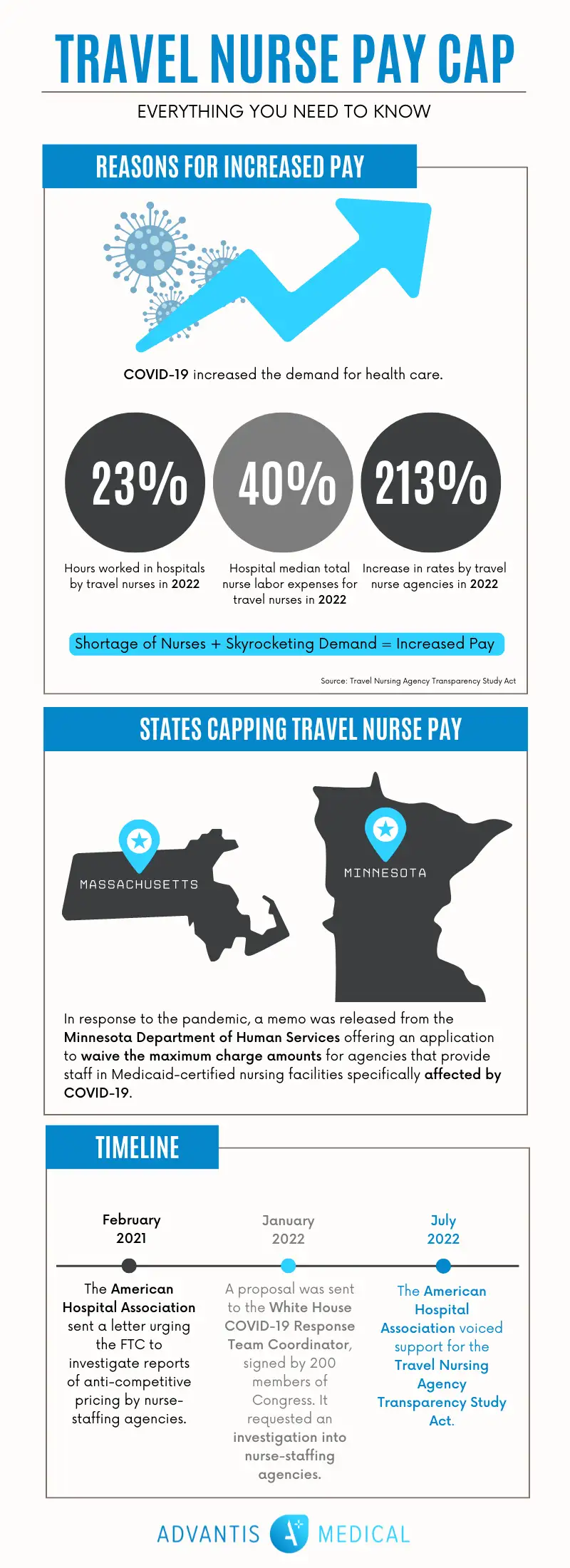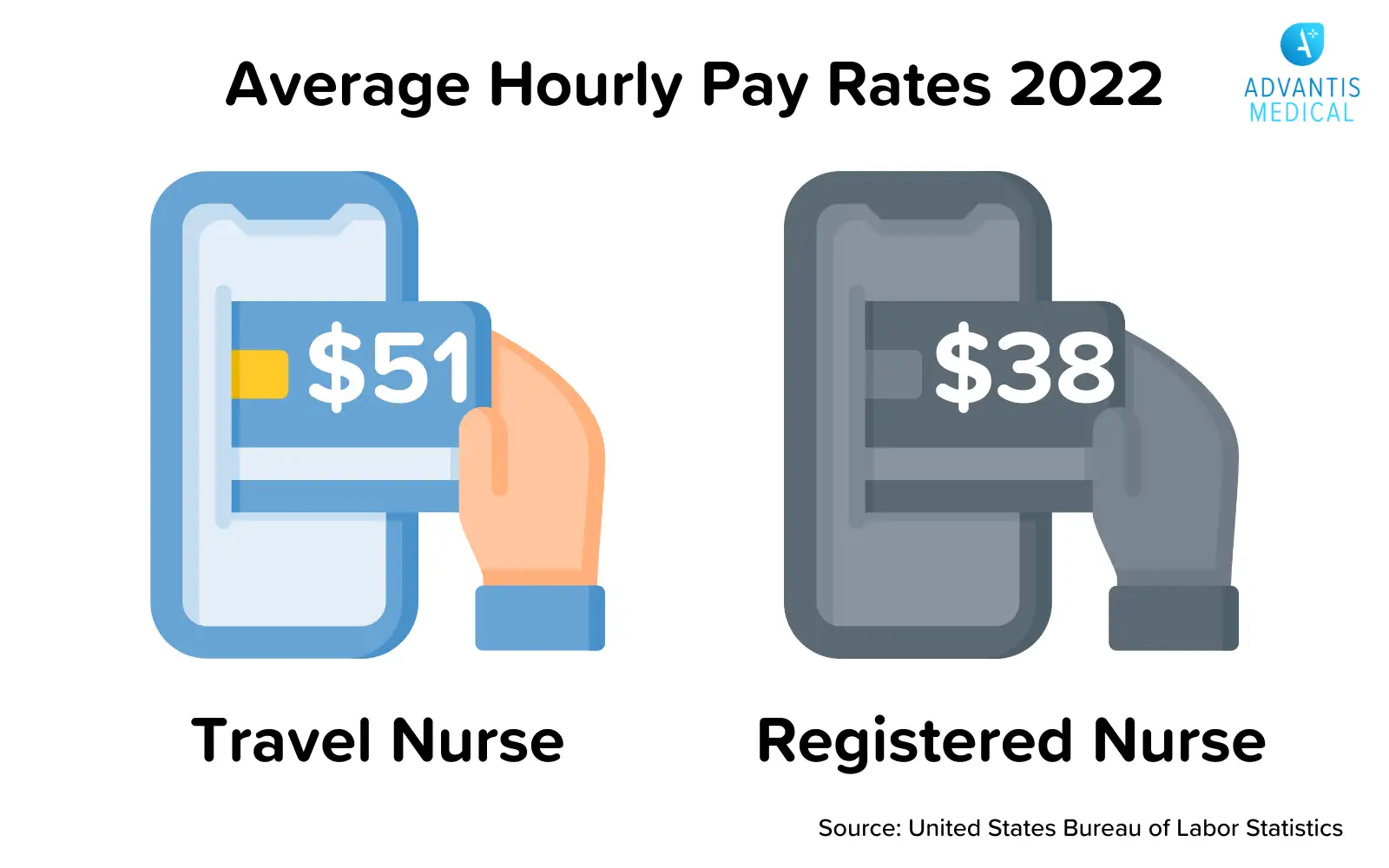At the beginning of 2022, you may have heard some buzz about a ‘travel nurse pay cap.’ This angered travel nurses who undoubtedly have strong feelings about such a greedy and insulting proposition. But let’s not get ahead of ourselves. What are the facts surrounding a travel nurse pay cap and how would nurses be affected?
What is the Travel Nurse Pay Cap?
First of all, there is no travel nurse pay cap. You can thank social media for exaggerating and spreading misinformation as it often does. Here are the facts of how this thought even came into existence:

In January 2022, a proposal was sent to the White House Covid-19 Response Team Coordinator, signed by 200 members of Congress. The proposal specifically requests an investigation into nurse-staffing agencies as it is believed they have inflated their costs and may be in violation of consumer protection laws.
The letter states staffing agencies have more than tripled their rates from what they were pre-pandemic and then kept 40% of profits for themselves.
A year prior in 2021, the American Hospital Association also sent a letter urging the FTC (Federal Trade Commission) to investigate reports of anti-competitive pricing by nurse-staffing agencies. They claim these “outrageous rate hikes” are exploiting the pandemic and negatively affecting hospital costs and patient care.
The 2022 Bill to Cap Travel Nurse Pay
More recently, in July 2022, the American Hospital Association voiced support for the Travel Nursing Agency Transparency Study Act. The following are some of the study points introduced in the bill to Congress:
- Investigate payment practices of travel nurse agencies including price gouging and taking excessive profits
- The difference between how much agencies charge health care systems versus how much nurses receive
- If agencies can provide more transparency regarding their profit and their payments made to nurses
- How rural areas in the United States have been affected by the rise of travel nursing and labor shortages
- How states that have imposed travel nurse pay caps were affected by the market reaction
States Capping Travel Nurse Pay
Massachusetts
Massachusetts’ Executive Office of Health and Human Services has instituted a travel nurse pay cap for “temporary nursing services.
Minnesota
Minnesota also calculates the annual wages of nurses and nursing assistants and places limits on the amount that Supplemental Nursing Services Agencies can charge. The maximum rate for RNs effective through 2021 was $58.08 per hour, a less than 1% increase from 2020. In response to the pandemic, a memo was released from the Minnesota Department of Human Services offering an application to waive the maximum charge amounts for agencies that provide staff in Medicaid-certified nursing facilities specifically affected by Covid-19.
As a result of these states capping travel nurse pay, agencies struggle to recruit nurses in these locations as they can find higher pay elsewhere.
Reasons for the Increase in Travel Nurse Pay
All of the memos and letters acknowledge that travel nurses were necessary to cover staffing gaps and the high demand for care due to Covid-19. Details in the Travel Nursing Agency Transparency Study Act provide interesting statistics regarding travel nurses and associated costs in response to the pandemic:
- Hours worked by travel nurses in hospitals grew from 4% in 2019 to over 23% in 2022
- Hospitals spent a median of 40% of their total nurse labor expenses on travel nurses in 2022, compared to under 5% in 2019
- Travel nurse agencies increased their rates in that timeframe by 213%
It’s an easy equation. A shortage of nurses + A skyrocketing demand = Exponential rate hikes
Staffing Shortages
The pandemic highlighted a problem that has plagued the nursing profession for years. The American Nurses Association points to increased costs as being part of a larger systemic problem. If you want to truly solve the problem that led to rate increases in the first place, you have to get to the root of the nursing shortage. Better work environments, appropriate compensation and benefits, and patient safety are required to attract and retain nurses.
Supply and Demand
It’s not hard to understand that when the demand for a product or service goes up yet the availability of that product or service remains the same or decreases, prices rise.
A spokesperson for the American Staffing Association believes this is the reason for higher rates. Essentially, nurses responded to a crisis. They were placed suddenly into overburdened work environments without proper support, often in large cities that come with a higher cost of living. This merits hazard pay.
The Potential Effect of a Travel Nurse Pay Cap
Lawmakers claim to vehemently oppose the idea of a capping travel nurse pay and are strictly targeting travel nurse agencies. None of the letters mention capping the pay of nurses. But if these investigations do find that travel nurse agencies are charging unnecessarily high rates for their own profit, new policies would likely affect the pay of nurses, even if unintentionally.
The institution of a travel nurse pay cap has the potential to have grave outcomes for an already weakened healthcare workforce. In an attempt to control costs, the outcome may further reduce supply (i.e. nurses).
On the other hand, a potential positive effect of an investigation into the practices of travel nurse agencies is fair and equal pay across the board.

Travel nurses know better than anyone how agencies’ pay rates can vary, even for the same job at the same hospital. Is it possible that a mandate could prevent price gouging, allowing hospitals to pay permanent staff higher wages, improving retention and overall staffing?
For now, there is no response to Congress’ letter or information on the progress of the Travel Nursing Agency Transparency Study Act. Regardless of the outcomes, nurses must simply continue to negotiate and pursue compensation packages that meet their needs.
Advantis Medical Staffing is a travel nursing agency that puts travelers first. We believe in competitive pay and delivering the ultimate travel clinician experience. Sign up on AdvantisConnect to browse jobs and get connected to your personal recruiter.









